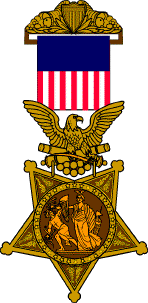John Kane (Medal of Honor) facts for kids
Quick facts for kids
John Kane
|
|
|---|---|

Civil War era Army Medal of Honor
|
|
| Born | 1831 or 1832 Ireland |
| Died | May 8, 1881 Clyde, New York |
| Buried |
Saint John's Catholic Cemetery
Clyde, New York |
| Allegiance | United States of America |
| Service/ |
United States Army Union Army |
| Years of service | 1862 - 1865 |
| Rank | Sergeant |
| Unit | Company K, 100th New York Infantry |
| Battles/wars | assault on Fort Gregg |
| Awards | |
John Kane was a brave American soldier who fought in the American Civil War. He earned the Medal of Honor, which is the highest award for bravery in combat. Kane received this special medal for his courage during the attack on Fort Gregg. This important event happened on April 2, 1865. He was given the award on May 12, 1865.
Contents
John Kane's Early Life and Service
John Kane was born in Ireland around 1831 or 1832. When he was about 28 years old, he moved to the United States. In August 1862, Kane joined the US Army. He signed up in Buffalo, New York.
He became part of Company K in the 100th New York Infantry. This unit was a group of soldiers from New York who fought for the Union Army. The Union Army was the army of the northern states during the Civil War.
Fighting in the Civil War
John Kane served in the army for about three years. He was a Sergeant, which is a leader of a small group of soldiers. His time in the army was during the final years of the Civil War. This was a very important and difficult time in American history.
The Attack on Fort Gregg
One of John Kane's most famous actions was during the assault on Fort Gregg. This battle took place on April 2, 1865. Fort Gregg was a strong fort that protected the city of Petersburg, Virginia.
The Union Army needed to capture this fort to win the battle. The fighting was very intense and dangerous. John Kane showed great bravery during this attack. His actions helped his unit succeed.
After the War
John Kane finished his service in the army in June 1865. He was officially released from duty with his regiment. He passed away on May 8, 1881. He is buried in Saint John's Catholic Cemetery in Clyde, New York. His bravery during the Civil War is remembered through his Medal of Honor.
 | Charles R. Drew |
 | Benjamin Banneker |
 | Jane C. Wright |
 | Roger Arliner Young |

